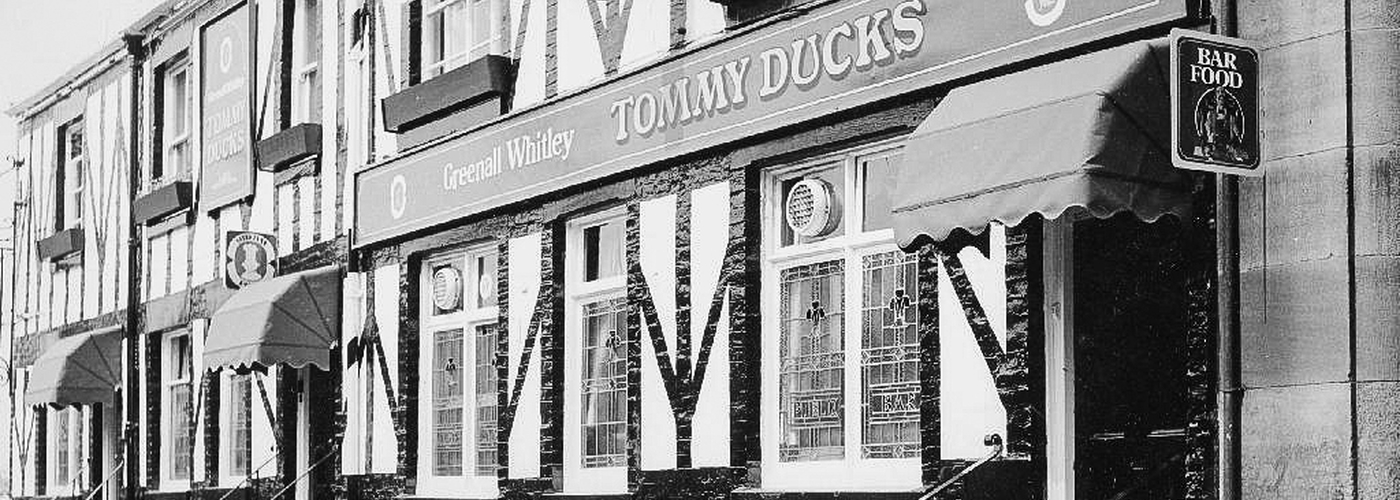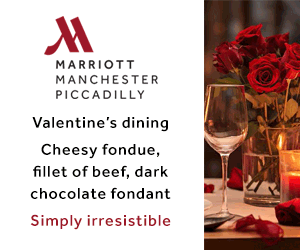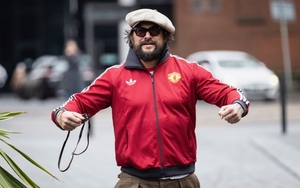Jonathan Schofield interviews Alan Douglas who led the Greenall's sneak demolition
“This flatbed truck turned up carrying a caterpillar tractor with this big bucket on it, one of those buckets with teeth. I told the driver that all the utilities had been sorted so he could get on with it. He put the bucket under the eaves and went straight in. As he pulled it out sparks were flying everywhere. I shouted, “Hold on, Hold on! The electrics were supposed to have been disconnected.”
Purely a commercial decision. The pub was worth 20K, the site was potentially worth £15m, maybe £20m.
“The driver said, “Too late now, mate.” Four times he pushed his bucket in and then, suddenly, the building collapsed. Talk about Spielberg. There was a tremendous crash and the biggest cloud of crap Manchester had seen for years spewed up. There was a bit of a breeze too and it blew all that crap over the back of the Midland Hotel. Of course, there was a bill to pay for cleaning the hotel later but it was mission accomplished.”
Alan Douglas pauses for a second. The 80-year-old stares into the middle distance and into the past, back to 1993, seeing it all in his mind’s eye.
“I remember it so clearly,” he says.
This is the first time a former director of Greenall’s has spoken about the exact circumstances of one of the most notorious sneak demolitions in Manchester’s history. Tommy Duck’s overnight disappearance 29 years ago is still a byword for wanton, cynical, manipulative, corporate destruction.
Tommy Ducks and pubs' year zero
Since that demolition in 1993, pubs nationally have proved the most fragile of landmarks. On quiet days if you strain your ears you can almost hear them being demolished or undergoing conversion to nurseries, knock-off furniture outlets or apartments. The savage way in which Tommy Ducks disappeared seems year zero for the decline of traditional boozers, a sign of things to come.
Nor was Tommy Ducks just any pub. As one old pub guide from the period reads, “It is very popular pub with worker/student/business person alike and is a meeting place for many regulars and characters of the city.” On weekends it was a proper party pub, perhaps resembling the modern-day Millstone on Thomas Street but with a younger demographic.
Its décor was almost nationally famous, not for the glass-covered coffins acting as tables or the stuffed fox in a cabinet but because female customers in the 1970s and 1980s, had been encouraged to leave their underwear behind, and the pub was festooned with knickers like a Santa’s Grotto is festooned with bunting.
“The past is a foreign country: they do things differently there”, LP Hartley wrote in The Go-Between. There is no more foreign country than the recent past as our article on 1975 pubs here illustrates and as this Greenall Whitley ad from the eighties reveals, watch out for the fellas staring at the barmaid’s backside.
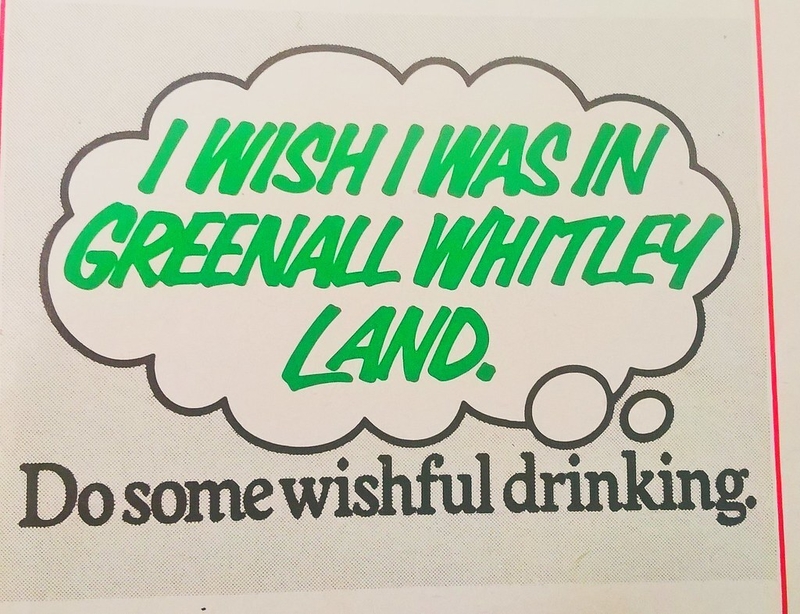
Why was the Duck ditched?
Back to the tragic demise of Tommy Ducks.
“So,” I ask Douglas, “what triggered the demolition?”
“It was a purely commercial decision,” he says. “There were four cottages knocked into one, completely isolated, just behind one side of the Midland Hotel. It was a prime site, the existing building didn’t seem to fit the street pattern or anything, didn’t even face the main street. The pub building was worth about twenty grand, the site was potentially worth £15m, maybe £20m.”
Douglas opens his arms and shrugs his shoulders. It's a gesture indicating how commercially it was a no-brainer. We’re sat in a cute Warrington pub, The Lower Angel. Warrington was the home of Greenall’s and remains the home of Douglas. The Lower Angel is exactly the sort of old-fashioned pub that’s becoming rare and rarer. If the décor were more flamboyant it could be Tommy Duck’s.
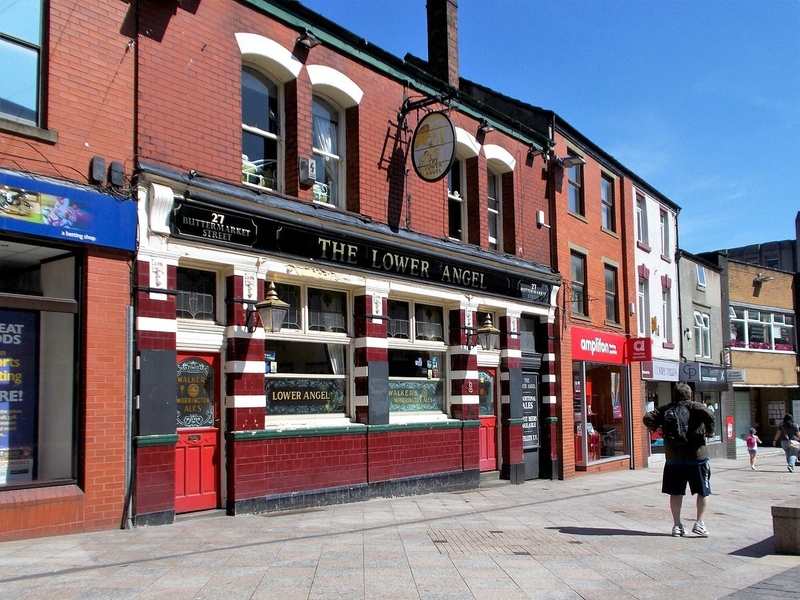
“But why demolish Tommy Duck's in February 1993, why just then?” I ask.
“Well,” says Douglas, “Somebody at Greenall’s must have got notice the conservation order in that area of Manchester was coming to an end on the Friday night - 19th February, I think it was. Greenall’s knew this and they thought it’d be listed or have some building order on it or placed back under a conservation order. This was due to happen on the Monday.
“I got a call from Mr Greenall and the MD. They said, 'You know Tommy Ducks in Manchester? We’re going to drop it.'
“I said, 'What do you mean we’re going to drop it?' I couldn’t believe it.
"They said, 'Demolish it, but we only have a small window of time in which to do it.'
“Discussing this later with my immediate boss," continues Douglas, "He initially suggested we just dig a big hole and push everything in. I wasn’t having that. I said there's thousands of pounds of kit, stock and so on in the pub. Why throw that into a hole?”
Douglas pauses and takes a sip of his drink.
“I said to him there’s something else as well.
“I said, 'Does the licensee, Tommy Grogan, know about this?'
“My boss said, 'I don’t think he does, you best tell him what’s happening and you’re going to tell him that he is under strict instructions to tell no-one else.'
“So, me, and the Tommy Ducks area manager, took Tommy to a pub in Manchester city centre.
“I said, 'We’ve got some news mate. There’s going to be some work done at your pub.'
"'Oh good,' he said, 'a refurb.'
“I said, 'A type of refurb, well, nothing like a refurb really. We’re going to demolish it.'
“It looked like his world had fallen in. I remember him saying in a shocked voice, 'When are you going to do it?'
"'Next weekend,' I said.
"'What?' he said.
"We told him not to worry, we’d look after him as he lived on the premises. We were going to move him to somewhere else, find him another outlet, put all his personal effects carefully in storage. He wouldn’t lose any money. He seemed a little calmer with that after he’d got over the initial shock.”
Timing is everything
“There must have been some legal hoops to jump through,” I say.
“There were,” says Douglas. “But we designed it like a military operation. We phoned the police to say there will be some activity with a refurb at the pub, so if they see activity on Saturday very late and through Sunday they know what we’re doing. They were quite happy with that.
“Then we got in touch with the electricity, gas, water, the utilities to cut everything off. When we had that sorted, we had to inform Manchester Town Hall. Bit cunning this one.
“We put together a letter of intent about what we were going to do. We took the letter into the Town Hall after two o’clock on the Friday immediately before the demolition and made sure we had it stamped as received. We knew that people on Friday afternoons were thinking about going home, or went for lunch, or for a drink in a pub, and didn’t come back to work until later and then only for a short time before they headed off for the weekend. Nobody read the letter that Friday it seems.”
We freshen our glasses. I suggest to Douglas, given the proximity of Tommy Ducks to the Town Hall, some of those Town Hall people had maybe enjoyed, unbeknownst to them, their last drink in the pub. This scenario seems uncannily like the plot of The Hitchhikers Guide to the Galaxy by Douglas Adams in which the people of Earth have no idea their planet is about to be demolished to build an intergalactic bypass.
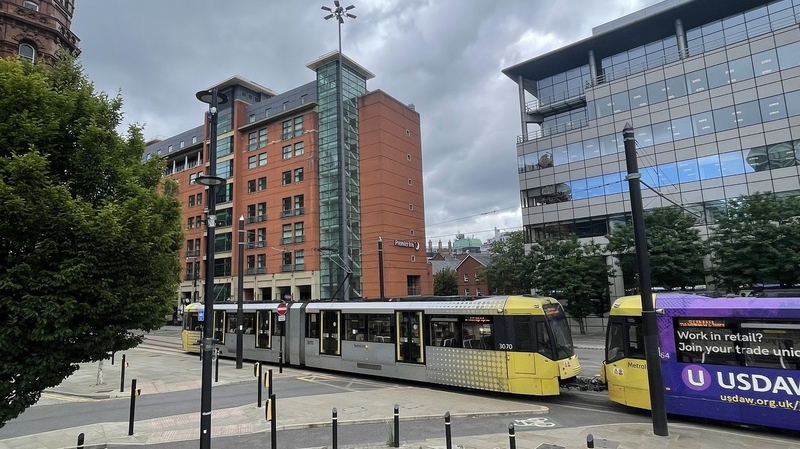
Last orders, please
“Go on,” I say, “so what happened next?”
Douglas takes a sip of a fresh beer and says: “On the Saturday night I left my house at half ten, and picked up a couple of area managers. We all had our tools with us. When we got to the pub it was after closing time and the staff had left, so we just got cracking dismantling the place, making sure we got everything of value out.
“I remember we asked Tommy where the safe was and it turned out to be upstairs in his office. Must have weighed about four hundred-weight so we thought we’d use two builders’ planks to slide it down the stairs. That worked better than we thought, we tipped it over and it flew down into the stairwell but didn’t stop there and ended up crashing through the floor into the cellar.
“Later Tommy’s furniture van came and he took his things away. We left about two in the morning having taken everything of physical value out. We were back on site by eight thirty Sunday and took all the drink stock away. Other bits and bobs, that might have been memorabilia from customers was put into storage and then taken to The Willows in Salford where people could pick it up.”
I interrupt Douglas’s flow: “You’d informed the police, I know, but didn’t any passers-by ask what on earth was going on?”
“It was 1993, the city centre was dead on a Sunday,” says Douglas. “The pub didn’t open, very few did in the centre on a Sunday. I have this one memory of a family, Chinese I think, taking pictures of us before the Caterpillar arrived. It looked like they were thinking what a classic and traditional English pub that is.”
“Those must have been the last pictures ever taken of Tommy Ducks,” I say. That struck me then, and still does, as poignant. Somewhere there are photos gathering dust or maybe in a scarcely opened album, recording the last moments of a famous Manchester pub; forgotten snaps from an ancient holiday.
I want to know what happened to one element of Tommy Ducks.
“Who pulled the knickers down?” I ask, unable to stop myself from phrasing the question in that manner.
“That was one of the amusing moments,” says Douglas. “We’d left them hanging from the ceiling. The last thing I saw when I left the pub was a couple of Irish lads in the demolition gang prancing around wearing all this female underwear.”
Despite this tale of sneaky demolition it’s hard not to like Alan Douglas. He’s had a fascinating life and the conversation floats across lots of topics. He’s also an encyclopaedia of North Western brewery knowledge, which perhaps he should be. He worked his way up the hard way from an apprenticeship at the now defunct Peter Walker's brewery in Warrington, leaving school at sixteen. He’s got an amiable character too, almost raffish, an infectious smile and tells the story of the loss of Tommy Ducks, 29 years ago, as though it happened yesterday. Everybody at Greenall's knew it had been a big thing.
“Do you ever have any qualms about the underhand way the demolition happened?” I say.
“No, I don’t have any qualms,” says Douglas swiftly and decisively. “We had a job to do and we did it.”
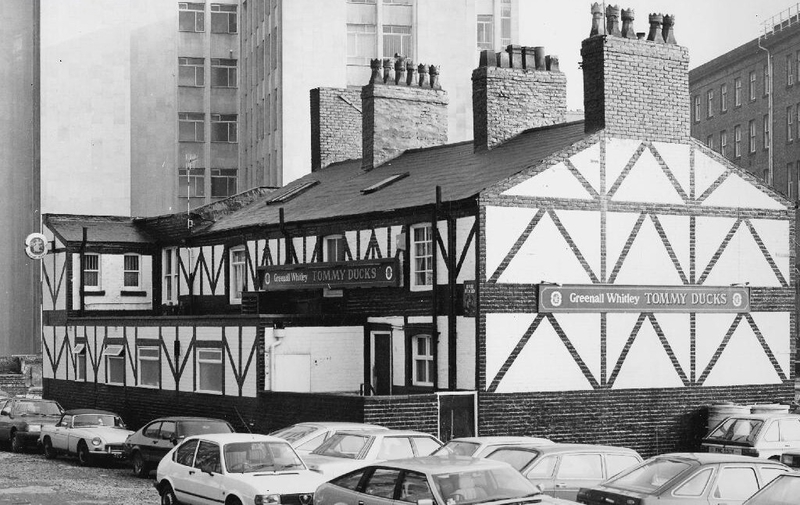
A tiny slap on the wrist
When the city and media realised what had happened with Tommy Ducks there was an outcry. It was even mentioned on national media. Subsequently, Greenall’s spun a fib saying a structural fault had meant they had to demolish the pub and it was done at night to avoid disruption to the city.
During a subsequent inquiry into the disappearance of the pub, magistrate Jane Heywood was having none of it. She said the demolition "does seem to be a deliberate intention to hide what was going on from the local authority. What was done is very serious. (Greenall's) have completely ignored legislation.”
Not that there was much in the way of retribution. The maximum fine she could impose was £1,500 which was a joke. Greenall’s made millions from their urban vandalism.
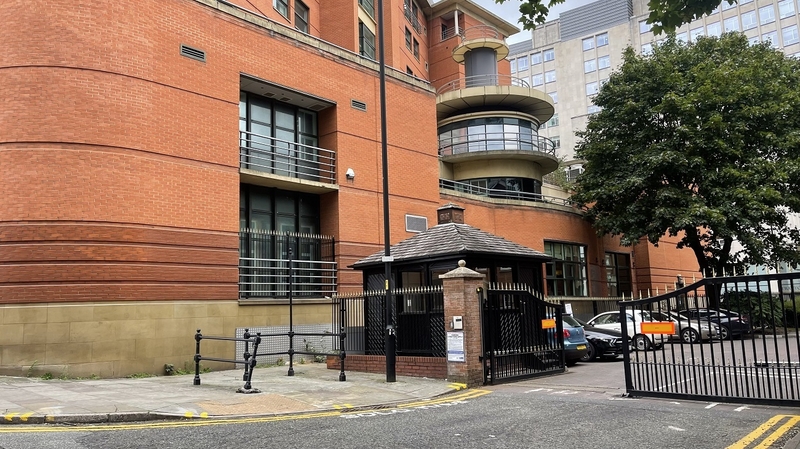
A changing city
The 1993 demolition took place when Manchester city centre was really starting to change. And Jeez, it needed to, although not necessarily through rogue demolitions. The picture below shows how bad things had become in central Manchester following the decline of the seventies and eighties. The city centre was occupying half the area of what it had done a century before.
Tommy Ducks was an island in a wasteland of surface car parks stretching away from the pub down Lower Mosley Street. The Bridgewater Hall development was still a couple of years away.
There was a hospitality replacement for Tommy Ducks. The site is now occupied by a particularly dreary piece of half-architecture, the Premier Inn. This is well within the golden belt of the city centre’s 2022 core area rather than at its ragged 1993 edge. The Premier Inn describes itself as a "no-frills hotel", unlike the decoration in the former pub.
Modern resonance
Tommy Ducks' destruction was the harbinger of doom for thousands of traditional pubs across the country. It's said that at least 400 a year are closing. Society was changing, drinking habits were changing. A sad note here is while suburban and rural pubs have been laid low survivors in the city centre mostly hang on. Tommy Ducks would undoubtedly still be alive and kicking in 2022 if that mechanical mouth hadn’t chewed at its eaves.
Of course, there are many contemporary resonances as noted above. The latest casualty away from the city centre might soon be The Robin Hood in Stretford which closed in 2018. This is a splendid and handsome building but there is a proposal from a developer to create apartments within the old pub and houses on its giant car park. A local group has been formed to resist this and raised enough money, via a crowdfunder, to get a professional valuation and to submit a bid to buy the pub. This has been rejected but the group aren’t giving up.
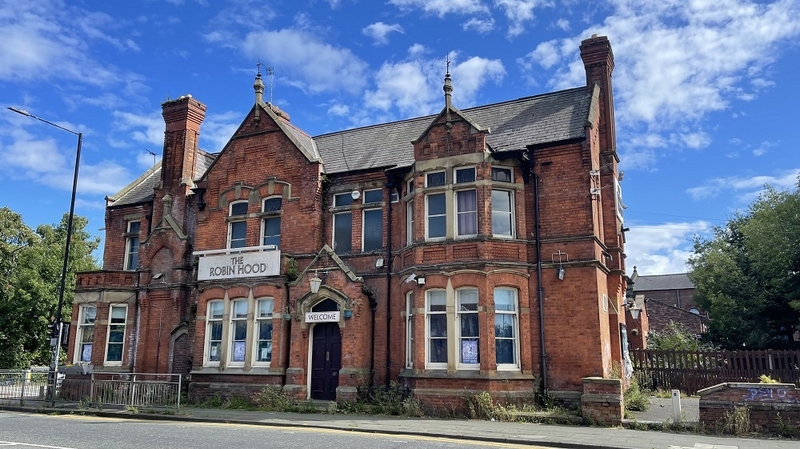
True, The Robin Hood had a tough reputation, but Stretford is changing. The Midland in West Didsbury was notorious for gangsterism in the 1980s but has blossomed into The Metropolitan. Pubs can change. Then again, the example of Black Friar in Salford might be used. That was closed for years but when Salboy built flats behind on spare ground they reopened the pub to add to the amenity of the area.
As Colette Nerini Chair of Save The Robin Hood group, says: “This is not only a beautiful and historic building right in the heart of Stretford but our community needs more shared social space. The type of place you could celebrate and commiserate together, come together to watch a cup final, start a shared interest club, or just know there’ll always be a friendly ear.”
With those words, Nerini neatly describes exactly the role a pub can play. The good news is with The Robin Hood there is no real prospect of a sudden and sneaky demolition.
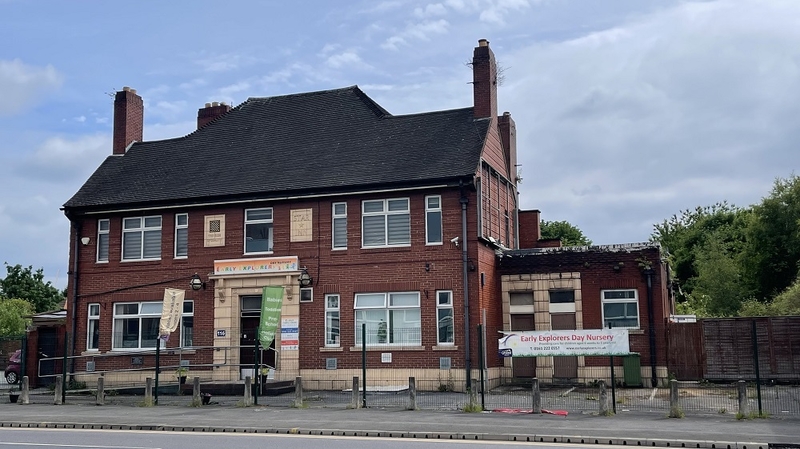
Tommy Ducks' epitaph
Let’s finish back at Tommy Ducks.
“I've just remembered. There’s one last thing,” says Alan Douglas in the Lower Angel, Warrington. “The MD had given the operation a title. He was a Harvard-trained bean-counter who lacked communication skills but had a very sharp mind. He had a lot of letters after his name. A few of the lads often added a few more letters before his name as well when talking about him. He was the type of man who when he walked into a room the air went cold.”
Douglas pauses and I get him back on track.
“So, what was the name of the sneaky operation?” I ask.
“Fuck the Duck.”
Follow Jonathan Schofield on Twitter @jonathschofield Every Saturday at 3pm Jonathan Schofield and colleagues conduct an entertaining and fascinating pub tour of Manchester.
Read next: First look: Libertine, Withington - open fire cooking in a former bank
Read again: Protest against Briton's Protection development to take place on Peterloo commemoration day
Get the latest news to your inbox
Get the latest food & drink news and exclusive offers by email by signing up to our mailing list. This is one of the ways that Confidentials remains free to our readers and by signing up you help support our high quality, impartial and knowledgable writers. Thank you!






